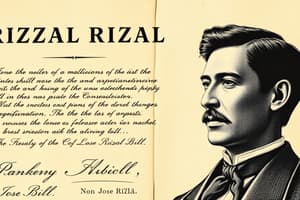Podcast
Questions and Answers
Who was the main proponent of the Rizal Bill?
Who was the main proponent of the Rizal Bill?
Claro M. Recto
What was the name of the bill that made Noli Me Tangere and El Filibusterismo compulsory reading?
What was the name of the bill that made Noli Me Tangere and El Filibusterismo compulsory reading?
Republic Act 1425
What year was the Rizal Bill co-authored in the Philippine Senate?
What year was the Rizal Bill co-authored in the Philippine Senate?
- 1945
- 1972
- 1960
- 1956 (correct)
The Rizal Bill faced no opposition from the Catholic Church.
The Rizal Bill faced no opposition from the Catholic Church.
What did proponents of the Rizal Bill believe the novels would inspire?
What did proponents of the Rizal Bill believe the novels would inspire?
What effect did opponents claim the Rizal Bill would have on the youth?
What effect did opponents claim the Rizal Bill would have on the youth?
The bill was an important example of the state’s effort to decolonize the _______ of the Philippines.
The bill was an important example of the state’s effort to decolonize the _______ of the Philippines.
What did Senator Francisco Rodrigo emphasize regarding nationalism and religion?
What did Senator Francisco Rodrigo emphasize regarding nationalism and religion?
What did Rizal encourage for children?
What did Rizal encourage for children?
How many years of Spanish rule did the Philippines experience?
How many years of Spanish rule did the Philippines experience?
Flashcards are hidden until you start studying
Study Notes
Overview of the Rizal Bill
- The Rizal Bill, introduced in 1956, mandates the compulsory reading of Jose Rizal’s novels Noli Me Tangere and El Filibusterismo in educational institutions.
- Claro M. Recto was the main proponent and faced intense opposition, especially from the Catholic Church, which viewed the novels as a threat to Catholic faith.
Key Figures
- Claro M. Recto: Senator and principal advocate for the Rizal Bill; accused of communism and anti-Catholic sentiment for sponsoring the bill.
- José P. Laurel, Sr.: Co-authored the bill, served as Chairman of the Senate Committee on Education, and supported the bill despite personal opposition.
Opposition Arguments
- Claims that the novels contain ideas harmful to the Catholic Church’s teachings and violate religious freedom.
- Concerns that required reading of the novels may negatively impact youth's moral and spiritual development.
- Arguments that Rizal's portrayal of the Filipino condition is a misrepresentation, further complicating the relationship between nationalism and religion.
Support for the Bill
- Advocates argued that Rizal’s works are essential for fostering patriotism and understanding Filipino ideals of freedom and nationalism.
- The bill emphasizes moral character development, civic consciousness, and the importance of citizenship duties.
- Proponents view the inclusion of Rizal’s works in education as essential for national identity and social transformation.
Historical Context
- The Philippines has undergone significant colonial experiences: 333 years under Spanish rule, 50 years of American occupation, and 5 years of Japanese rule.
- The Rizal Bill represents a significant attempt to reclaim and reshape Philippine culture, promoting a shift towards a post-colonial identity.
Educational Rationale
- The bill serves as the state’s effort to foster knowledge about the country’s true history and societal conditions, which promotes active civic engagement.
- Educators are encouraged to instill a sense of national pride and honor among Filipino youth, reinforcing the quote by Rizal about the importance of honor in life.
Conclusion
- The Rizal Bill reflects a pivotal moment in Philippine education and cultural identity, promoting literature that aims to inspire change and foster a deeper understanding of the nation’s heritage.
Studying That Suits You
Use AI to generate personalized quizzes and flashcards to suit your learning preferences.




